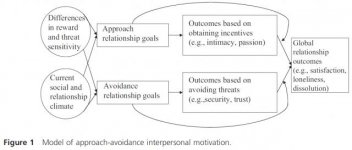Approach and Avoidance Motives and Close Relationships
January 3, 2012
Despite the fact that humans have a deep motivation to pursue and maintain close relationships, little research has examined social relationships from a motivational perspective. In the current paper, we argue that any model of close relationships must simultaneously account for people’s tendencies to both approach incentives and avoid threats in close relationships. To that end, we review research stemming from Gable’s (2006) social and relationship model of motivation on both the antecedents and the consequences of approach and avoidance goal pursuit in the context of close relationships. We conclude with recommendations for future research in this area...
Consider the following descriptions of two equally dissatisfied couples. Diane and Chris met in college and got married the summer after graduation. Over the years, their relationship has been secure and comfortable. They try not to argue, and they trust one another to not intentionally harm the relationship or give hurtful criticisms. However, each has an unsettling feeling that something is missing in their relationship; that they have drifted apart and become less intimate. Diane and Chris both enjoy their own separate activities, and they seldom laugh together or have interesting conversations. They are considering separating. Rich and Mary also met in college and married shortly after graduation. Over the years they have done a lot of fun things together and had many intimate and interesting conversations. They feel passion for one another, and some of their friends have commented on how much they appear to enjoy each other’s company at parties. However, they also often criticize one another and complain about each other’s habits. Indeed, the smallest disagreements somehow escalate into major brawls, and neither completely feels secure that the other will not cause emotional pain or be there when times get really tough. They are also considering separating.
We feel that a full understanding of approach and avoidance interpersonal motives and their related processes have direct implications for these two couples. The first couple can be described as being low in threats but lacking incentives, whereas the second relationship can be described as being high in potential rewards but also chock full of threats. These two different relationships may reflect the strength of both partners’ approach and avoidance motives and goals in the relationships. In addition, the current state of these two relationships may also contribute to the strength of the partners’ approach and avoidance motives. Any attempt to better these and other relationships needs to address both incentives and threats, as well as the processes that mediate those outcomes.

January 3, 2012
Despite the fact that humans have a deep motivation to pursue and maintain close relationships, little research has examined social relationships from a motivational perspective. In the current paper, we argue that any model of close relationships must simultaneously account for people’s tendencies to both approach incentives and avoid threats in close relationships. To that end, we review research stemming from Gable’s (2006) social and relationship model of motivation on both the antecedents and the consequences of approach and avoidance goal pursuit in the context of close relationships. We conclude with recommendations for future research in this area...
Consider the following descriptions of two equally dissatisfied couples. Diane and Chris met in college and got married the summer after graduation. Over the years, their relationship has been secure and comfortable. They try not to argue, and they trust one another to not intentionally harm the relationship or give hurtful criticisms. However, each has an unsettling feeling that something is missing in their relationship; that they have drifted apart and become less intimate. Diane and Chris both enjoy their own separate activities, and they seldom laugh together or have interesting conversations. They are considering separating. Rich and Mary also met in college and married shortly after graduation. Over the years they have done a lot of fun things together and had many intimate and interesting conversations. They feel passion for one another, and some of their friends have commented on how much they appear to enjoy each other’s company at parties. However, they also often criticize one another and complain about each other’s habits. Indeed, the smallest disagreements somehow escalate into major brawls, and neither completely feels secure that the other will not cause emotional pain or be there when times get really tough. They are also considering separating.
We feel that a full understanding of approach and avoidance interpersonal motives and their related processes have direct implications for these two couples. The first couple can be described as being low in threats but lacking incentives, whereas the second relationship can be described as being high in potential rewards but also chock full of threats. These two different relationships may reflect the strength of both partners’ approach and avoidance motives and goals in the relationships. In addition, the current state of these two relationships may also contribute to the strength of the partners’ approach and avoidance motives. Any attempt to better these and other relationships needs to address both incentives and threats, as well as the processes that mediate those outcomes.

